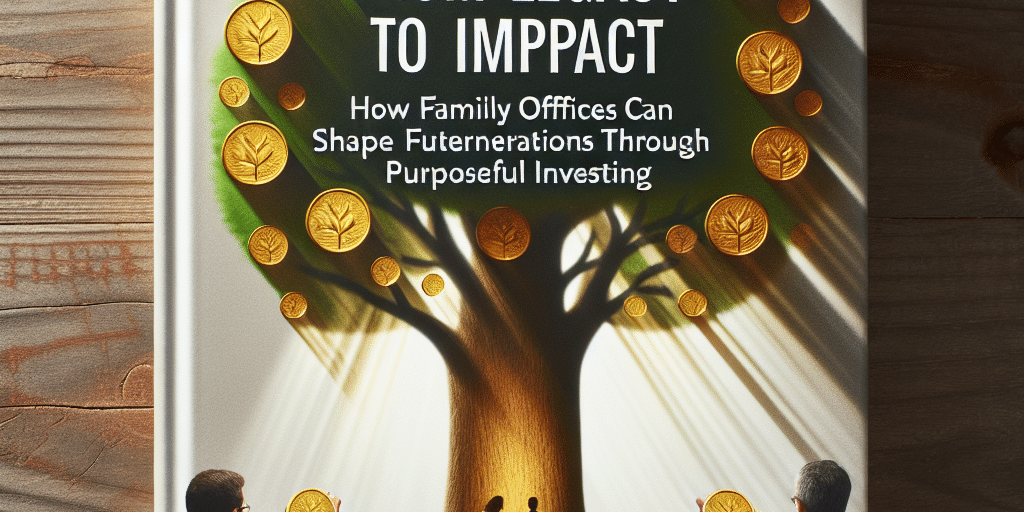In an age where social responsibility and environmental stewardship are at the forefront of global discourse, family offices are uniquely positioned to make a significant impact on the future. Traditionally focused on wealth preservation and the management of financial legacies, family offices are now recognizing the importance of aligning investments with values, leading to a sweet spot where financial acumen meets social impact. This shift is not merely a trend but an evolving paradigm that can shape future generations through purposeful investing.
The Evolution of Family Offices
Family offices, which manage the financial affairs of affluent families, have always focused on balancing risk, return, and legacy. Historically, their primary objective was to ensure the sustainability of wealth across generations. However, as societal challenges have magnified, families are increasingly viewing their capital as a tool for broader change. The emergence of socially responsible investment (SRI) and environmental, social, and governance (ESG) criteria represents a fundamental shift from traditional investment strategies to those that actively seek positive societal outcomes.
Purposeful Investing: The New Normal
Purposeful investing refers to the practice of making investments that not only yield financial returns but also create social and environmental impacts. This strategy allows family offices to engage with pressing global issues such as climate change, poverty alleviation, education, and health care. By committing to purposeful investing, family offices do not merely fulfill their fiduciary duties; they also engage in a transformative journey that can redefine their legacy.
Bridging Generations through Values
One of the critical dimensions of purposeful investing is its capacity to foster intergenerational dialogue over shared values. Many family offices engage in the practice of involving younger generations in the investment decision-making process. This approach not only imparts financial literacy but also strengthens the family bond and nurtures a collective commitment to social responsibility.
Younger generations are often more passionate about climate change, inequality, and social justice, and they seek alignment between their values and investment strategies. By incorporating these values into their investment decisions, family offices can help shape a worldview that supports sustainability, community resilience, and innovation.
Strategies for Purposeful Investing
Establish a Clear Mission Statement: The first step towards purposeful investing is defining a clear mission statement that outlines the family’s values and desired impact. This statement serves as a guiding principle for all investment decisions and fosters alignment among family members.
Diversify Impact Investments: Purposeful investing does not mean excluding traditional investment vehicles. Instead, it encourages the inclusion of diverse asset classes such as impact funds, green bonds, and social enterprises. This diversification ensures that financial returns are balanced with positive social outcomes.
Leverage Collaboration: Many family offices are increasingly collaborating with like-minded partners, including other family offices, foundations, and impact investors. By leveraging shared resources and knowledge, family offices can maximize their impact and drive collective action towards systemic change.
Engage in Active Ownership: Purposeful investors should not only provide capital but also engage with companies to encourage sustainable practices. Active ownership can take various forms, including shareholder advocacy, proxy voting on ESG issues, and supporting corporate transparency.
- Measure and Report Impact: Defining success in purposeful investing can be complex. Family offices should establish metrics to measure their impact and regularly report on their progress. Transparent reporting fosters accountability and encourages continuous improvement.
The Ripple Effect of Responsible Investment
When family offices commit to purposeful investing, they not only elevate their own legacy; they also create a ripple effect across broader society. By directing capital towards ventures that prioritize sustainability and equity, they can support innovations that tackle some of the world’s most pressing challenges. This, in turn, inspires other investors, corporations, and even governments to reconsider their own investment strategies.
Conclusion: A Legacy of Impact
As the world continues to change, the role of family offices in shaping the future becomes increasingly significant. By transitioning from traditional investment strategies to purposeful investing, family offices can craft legacies built on social responsibility and integrity. In doing so, they empower future generations with the knowledge, values, and tools needed to champion sustainability and respect for the community, paving the way for a more equitable and sustainable world. This transformative journey, from legacy-focused wealth management to impactful investment strategies, is not just a financial decision—it’s a profound commitment to shaping a better future for generations to come.











